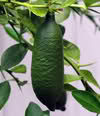| Author |
Message |
TRI
Citruholic

Joined: 13 Jan 2010
Posts: 399
Location: Homestead, FL Zone 10
|
| Posted: Thu 11 Mar, 2010 2:12 am |
|
| ilyaC wrote: | Tri,
I would like to share your optimism, but am not sure that you are right.
The agricultural revolutions are happening very rarely and only if there is an economic drive for them.
Actually , the freeze resistant citrus could be easily bred by conventional means during 100 years since Swingle hybrizations with poncirus.
Outside conspiracy explanations there is no economic interest in such varieties. Citrus industry have no interest in expansion outside of traditional areas; consumers are not ready to change from traditional varieties and decorative tree market is too small.
Concerning the understanding of freeze/stress resistance we are not yet there. Dozens of genes are cloned, but their interactions and detailed mechanism of resistance is not elucidated. Total sequence of clementine genome is under way but is not yet finished.
I estimate that we are at least 30 years before emerging of resistant citruses |
There is an interest to make citrus more cold hardy for economic reasons. The cost and time to replant huge acres of freeze killed citrus plants is very high. All that is needed is some trait changes to lower the freeze kill zone by about 8F. This still will not allow citrus to be grown much outside traditional areas, but it might be enough to allow the plants to survive the really severe freezes within Zones 9 and 10 and maybe even 8B. |
|
| Back to top |
|
 |
TRI
Citruholic

Joined: 13 Jan 2010
Posts: 399
Location: Homestead, FL Zone 10
|
| Posted: Thu 11 Mar, 2010 2:20 am |
|
Keep in mind that not even Poncirus trifoliata could survive the December 1989 or January 1982 freeze in Chicago. The wind chill during the December 1989 freeze in Minnesota was more than 90 F below zero! |
|
| Back to top |
|
 |
ilyaC
Citruholic


Joined: 04 Sep 2009
Posts: 276
Location: France, 40km South of Paris
|
| Posted: Thu 11 Mar, 2010 5:51 am |
|
| TRI wrote: |
There is an interest to make citrus more cold hardy for economic reasons. The cost and time to replant huge acres of freeze killed citrus plants is very high. All that is needed is some trait changes to lower the freeze kill zone by about 8F. This still will not allow citrus to be grown much outside traditional areas, but it might be enough to allow the plants to survive the really severe freezes within Zones 9 and 10 and maybe even 8B. |
Very delicate requirement: not to spread into zone 7-8. Sure, it is not resolving a topic of this discussion.
_________________
Best regards,
Ilya |
|
| Back to top |
|
 |
gregn
Citruholic

Joined: 15 Oct 2006
Posts: 236
Location: North Vancouver, BC, Canada
|
| Posted: Sat 10 Apr, 2010 3:07 am |
|
OK - this is an interesting post to read. I think the big difference between northern Europe (incl. my area around Vancouver) and the southern United States, are the freezes and their duration. My understanding of the USDA zone system is to predict the ultimate low temperature a given area will experience. Of course there are exceptions to this from time to time. I think I am somewhere in between but have similar issues in the nearly 5 years of experimentation. The occasional freeze events we experience in Vancouver can be - maybe for a week duration and where the temperature does not get above freezing for an entire week. This is very difficult for my citrus to take - except for the poncirus trifoliata.
In the southern united states the freezes are typically a dip overnight then back up above freezing the next day. sometimes the temperature will drop to its low for maybe 1 to 2 hours or even less. We too have frosty nights where the temperature dips to -5 or -6c (21F) then up to +5 or +6c during the day this does not seem to harm my citrus so long as they are protected from the wind.
My big headaches occur when we get covered in a arctic air mass where temperatures stay below freezing and sometimes well below freezing for a long duration. I live in the only corner of Canada that is mild enough to grow about 5 varieties of Palms.
On another note, we were short on snow at one of the Olympic sites, the ski runs were bare snow had to be trucked in . Since the athletes left town nearly 3 metres (9 feet) of snow has fallen on the local ski hills 
Go Figure 
Greg
_________________
Gregn, citrus enthusiast. North Vancouver Canada. USDA zone 8. I grow In-ground citrus, Palms and bananas. Also have container citrus |
|
| Back to top |
|
 |
Roberto
Citruholic

Joined: 02 Jun 2009
Posts: 132
Location: Vienna/Austria
|
| Posted: Sun 11 Apr, 2010 6:33 pm |
|
I is now going to get obvious what survived last winter. One of my sample of about 15 C. ichangensis seedlings (4 years old) survived with only little damage. All others show severe damage.
PoncirusXSunki-Mandarin had a bit protection from a evergreen plant and has survived quite well. Only sun-exposed parts are dead.
All Citrumelos are dead. Most Citsumas are dead some survived.
One of two Trifeolas may survive.
One positive surprise is, that the scion of Citsuma "Prague" which I had grafted to Poncirus in Autumn seems to live. This Citsuma produces sweet Satsuma-like fruit.
I will have to wait and see.
/Robert |
|
| Back to top |
|
 |
Las Palmas Norte
Citruholic


Joined: 18 Nov 2005
Posts: 199
Location: Lantzville, Vancouver Island
|
| Posted: Tue 13 Apr, 2010 1:28 am |
|
| gregn wrote: | | I live in the only corner of Canada that is mild enough to grow about 5 varieties of Palms. Greg |
Which 5 are you growing (assuming they're unprotected)? I can only grow one with any certainty, Trachycarpus.
Cheers, Barrie. |
|
| Back to top |
|
 |
TRI
Citruholic

Joined: 13 Jan 2010
Posts: 399
Location: Homestead, FL Zone 10
|
| Posted: Mon 19 Apr, 2010 4:35 am |
|
You will never need to worry about citrus psyllids or Huanglongbing disease in zone 7B or colder. The asian citrus psyllid is only hardy down to about 28F. It is a tropical insect that cannot tolerate freezing termperatures for long. |
|
| Back to top |
|
 |
Roberto
Citruholic

Joined: 02 Jun 2009
Posts: 132
Location: Vienna/Austria
|
| Posted: Mon 19 Apr, 2010 6:40 am |
|
there is something positive in nearly everything 
/Roberto |
|
| Back to top |
|
 |
gregn
Citruholic

Joined: 15 Oct 2006
Posts: 236
Location: North Vancouver, BC, Canada
|
| Posted: Sun 06 Jun, 2010 1:20 am |
|
Skeeter, Your sisters satsuma - was it a seedling or a cutting? I have heard satsumas are difficult to root (cuttings). I have tried a few different methods - all without success. We didn't get much frost this winter and NO snow ! - only a few frosty nights in December. My (in ground) satsuma, Changsha and for the first time my Juanita are in bloom now - meyer lemons have finished blooming 
Greg
_________________
Gregn, citrus enthusiast. North Vancouver Canada. USDA zone 8. I grow In-ground citrus, Palms and bananas. Also have container citrus |
|
| Back to top |
|
 |
Radoslav
Moderator


Joined: 03 May 2008
Posts: 453
Location: Slovak Republic
|
| Posted: Wed 30 Nov, 2011 5:10 am |
|
There are 2 big problems in case of hardy citrus varieties.
1. Lowest temperature to survive is only one part, but most important is kind of winter - how many frosty days or hours of permanent frost etc. etc. - for example plant can survive 1 hour of -17 Celsius, but is easily killed by -10 celsius if exposed for 2 days.
2. Problem of taste - I think that ability of poncirus to survive cames from that well known oil, which makes poncirus inedible. So, if we improve taste by crossing it always means, that we reduce presence of that poncirus oil.
btw: the goal is to get fruit. So, because of short season in countries with frosty winters - acceptable plant have to start flowering in spring, and fruit have to by mature in fall - max. end of november. |
|
| Back to top |
|
 |
ilyaC
Citruholic


Joined: 04 Sep 2009
Posts: 276
Location: France, 40km South of Paris
|
| Posted: Wed 30 Nov, 2011 7:54 am |
|
I would add to the point 1 of Radoslav my observation that some "hardy" citruses are coming out of winter dormancy too quick. Here in Northern part of France we can have very big fluctuations in winter temperatures.
I lost my C.ichangensis during one of the winters when after near zero centigrade temperatures we had for 10 days +15C followed by frosts of -8C. Ichangensis started a new growth and even show the flowering buds but was completely destroyed by this rather mild freeze. Hybrids adapted to this sort of unstable winters should have a profound winter dormancy that is a feature of poncirus and some kumquats.
Fruits of "hardy" varieties are not freeze hardy, probably because they do not contain much of the factors that determine hardiness of leaves and stems. They are mostly protected by the degree of dissolved solids (sugars and acids) that are measured by Brix index. Poncirus fruits start to freeze at -8C.
Oil in the fruits could be one of the antifreezing factors, but clearly it is not playing a major role, poncirus overall hardiness being a multifactorial, polygenic trait.
That means that future zone 7-8 fully hardy varieties should ripen early in the autumn.
_________________
Best regards,
Ilya |
|
| Back to top |
|
 |
Roberto
Citruholic

Joined: 02 Jun 2009
Posts: 132
Location: Vienna/Austria
|
| Posted: Wed 30 Nov, 2011 6:43 pm |
|
I will dare another try this winter. Citrumelo (scion from Ilya -thank you!) on top of 1m Poncirus. Protected by cloth and straw. Please keep your fingers crossed!
/Robert |
|
| Back to top |
|
 |
Radoslav
Moderator


Joined: 03 May 2008
Posts: 453
Location: Slovak Republic
|
| Posted: Thu 29 Dec, 2011 6:38 am |
|
"Frost tolerant" citrus breeder Don has new web page - looks like he ends most of his breeding projects.
http://hardycitrus.com/ |
|
| Back to top |
|
 |
Laaz
Site Owner


Joined: 12 Nov 2005
Posts: 5668
Location: Dorchester County, South Carolina
|
| Posted: Thu 29 Dec, 2011 11:33 am |
|
Thanks, I have been wondering what he's been up to. He keeps changing the url of his site.
_________________
Wal-Mart a great place to buy cheap plastic crap ! http://walmartwatch.com/ ...
 |
|
| Back to top |
|
 |






















